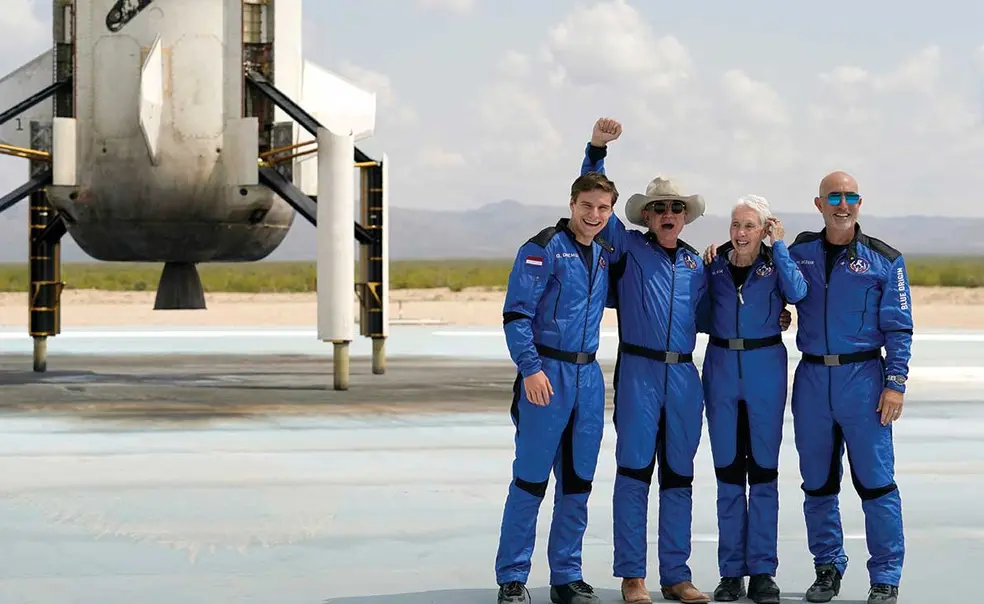Douglas Rushkoff ’83 Explains the Post-Apocalyptic Plans of the Rich
Rushkoff’s new book details how the ultra-wealthy plan to escape from the rest of us

In 2017, Douglas Rushkoff ’83 was invited to give a talk about “the future of technology.” The author, technology commentator, and media theorist was an early writer on the topic and would speak to groups of wealthy tech investors about it. To his surprise, Rushkoff found himself in a room with five billionaires and millionaires, slowly discerning what they really wanted: advice on surviving “the event,” as one of them called it. The coming “environmental collapse, social unrest, nuclear explosion, unstoppable virus, or Mr. Robot hack that takes everything down,” as Rushkoff later wrote in a viral Medium essay. To prepare, one of the men was building an underground bunker system and wondered how to ensure his security personnel would not turn on him.
From that encounter, Rushkoff realized that the very people who are most damaging the world believe that catastrophe is coming — and are seeking to escape it. “Success is understood as separation,” Rushkoff tells PAW, citing Elon Musk and Jeff Bezos ’86’s preoccupation with settling Mars as further examples. “The new American dream is to make enough money so that you can insulate yourself from the damage you’re creating by earning money in that way.”
How we got to this point, and what we should do about it, is the subject of Rushkoff’s newest book, Survival of the Richest. It interweaves critiques of technology, capitalism, and media with humorous firsthand accounts of his interactions with the tech millionaire set — the givers of TED Talks, the investors in and inventors of “moonshots” and “unicorns,” and the holders of what Rushkoff dubs “The Mindset.” He defines that mindset as the belief that, with enough money and technology, it’s possible to outrun the impact of our development when the laws of physics, economics, and morality say otherwise.
Rushkoff begins by revisiting the early days of the internet, which he remembers as a free-spirited, idealistic space, and the moment it became co-opted by investment capital. After the ’90s dot-com crash, “money was no longer seen as a way to fund new technologies; new technologies became understood purely as ways of making fast money — as long as you could get out in time,” he writes.
From here, he zooms back to the larger history of centralized currency and the age-old practice of making money from interest-bearing loans. The underlying math of monopolistic business incentivizes companies to keep growing until they become forces for ill, wiping out existing local industries, concentrating power away from workers, and extracting all they can. He draws a line between the genocidal and colonialist expansion of the first mega-corporations, like the British and Dutch East India companies, and the world-dominating mindset of today’s tech entrepreneurs. Then as now, “financiers making loans only benefit from big new projects requiring massive amounts of capital.”
What’s different now, however, are the new heights of abstracted financialization the internet allows (Rushkoff calls it “going meta”). In the old economy, there was a limit to how far things could scale; “manufacturing hits the hard limits of human labor and physical matter itself,” Rushkoff writes. “The digital realm appeared to solve this Industrial Age problem by transcending the laws of physics.”
The result is websites like eBay or Google that make money from the activities of their users rather than selling merchandise of their own; platforms like Kayak that aggregate info from other sites (that are themselves aggregators); and social media companies that turn their own users into both product and labor force, selling their data to market researchers. Financial abstractions like derivatives and mortgage-backed securities ushered in the 2008 financial crisis; today, investors have leveled up to new scalable abstractions like cryptocurrency and NFTs.
Rushkoff, who teaches digital economics classes at CUNY, also interrogates the empirical and data-oriented thinking of the tech world, which he sees as “capitalism’s imperative to render everything into a suitable form for the marketplace.” Under this mindset, anything that cannot be easily quantified (“the squishy stuff”) gets discarded.
Fortunately, not every tech billionaire wants to leave humanity behind. But even those who want to stay and help are hobbled by “The Mindset,” Rushkoff says. The result is that the solutions they espouse are equally totalizing and top-down — and thus, inherently harmful. From biohacking to space colonization to universal basic income, “technosolutions are too commonly informed by the values inherent in technology itself: exponential growth, automation over human intervention, forward momentum, platformization, and a disregard for existing conditions on the ground,” he writes. They involve throwing more technological innovation at the very problems caused by technology, or insisting that it’s possible to have it both ways.
As an example, Rushkoff cites the ongoing push for wide-sweeping, all-at-once investment in solar energy, when the metals mining and massive amounts of water required to make the panels could be just as harmful to the Earth. Replacing things slowly as they wear out is better for the planet than completely leveling an old system and replacing it with a new one — but investors don’t make money that way. Rushkoff writes about meeting a celebrated entrepreneur who wants to build a self-sustaining eco-village — and clear a swath of forest to do so. At a gathering of tech elites aimed at solving world problems, Rushkoff tells them about existing organizations already doing the things they’re proposing. Tellingly, somebody replies, “If they’re so good, why haven’t I heard of them?”
“These totalizing solutions perpetuate the myth that only a technocratic elite can possibly fix our problems” while diverting funding to long-shot “boondoggles,” Rushkoff writes. But all they accomplish is making the wealthy even wealthier.
The solutions to our woes are modest, incremental, and collectivist, Rushkoff believes — the antithesis to “The Mindset.” “People hate to hear this,” he says, “but I’m arguing for degrowth.” As he writes, “Repairing what we have, scaling back, or even seeking incremental progress doesn’t make for an exciting podcast, online panel, or TED Talk. But neither does it require massive capital investment, sales speeches, or ‘buy-in.’”
At the individual level, degrowth means meeting one’s neighbors, engaging in mutual aid and other community efforts, traveling less, buying local, replacing things slowly as they wear out, and supporting co-ops. It means a circular economy that doesn’t depend on growth. When Rushkoff said this to those five uber-wealthy men, “they rolled their eyes.” But nonetheless, he urges the wealthy to embrace, not escape, humanity. He concludes, “Either we all make it, or none of us makes it.”












3 Responses
Larry Campbell ’70
3 Years AgoThe Folly of a Magic Button Solution
I was quite pleased to read a quote from Douglas Rushkoff ’83 about the folly of throwing more technological solutions at problems caused by technology (Princetonians, November issue). My 1970 senior thesis regarding a model for community organizing around the ecological and global warming crisis concludes that too many people are waiting for an unrealistic technological “magic button” that they will gladly push to save us while ignoring the effects of individual lifestyle choices. I wrote, “Man can control the extensions of himself he has built in machines … but only at the cost of more dehumanizing mechanical extensions.
“The only real solution must include a drastic change in lifestyle for every overproducing and overconsuming person. That is a lot of change. I think it could happen, but there is certainly no available rational evidence that it will.”
I have finally reached a soul-satisfying point of achieving my climate-change adaptation goal of building a tiny off-grid homestead in rural Montana where, as Walter Kirn ’83 points out (also in the November issue), there tends to be a negative cachet associated with graduating from Princeton. My hard work using primitive tools has eclipsed any unfortunate resentment of elite education or assumed condescension.
Sadly, I still don’t see much evidence that we will rise to the moral test of our time by sacrificing a bit of our wealth and material indulgence in the interest of mitigating climate change. But the incessant talk, talk, talk continues adding hot air.
Katherine Brokaw ’82
3 Years AgoAn “Atlas Shrugged” Fantasy
The mindset described in Douglas Rushkoff ’83’s new book (Princetonians, November issue) is like a bad imitation of an already bad novel, Ayn Rand’s Atlas Shrugged, the libertarian gospel. If you’ve never read it, it ends with the powerful, rich technocrats abandoning society, the entire world descending into chaos, billions of regular people left to their fates and dying, and the elite few who control entire industries holed up together in a safe, remote location, planning to rebuild the world according to their own ultra-capitalist, anti-democratic ideals. For a sardonic recent look at this mindset, I recommend watching the movie Don’t Look Up, with special attention to the character played by Mark Rylance.
The mere millionaires among us, if they embrace this worldview, might do well to consider that the billionaires consider them also to be disposable collateral damage on their journey to Rand’s utopia. After all, there won’t be enough seats on the spaceship for everyone, and in their world, those who have the most gold rule.
Kazuko Suzuki ’83
3 Years AgoLeaving for Mars?
My husband says he’s more worried that the billionaires will send the rest of us to Mars and keep Earth for themselves!